2017医学考博英语作文分析及范文指导2
医学考博英语作文万能模板及范文
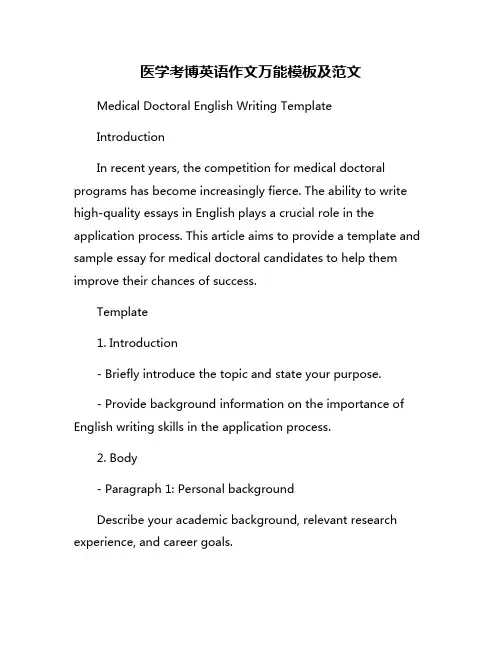
医学考博英语作文万能模板及范文Medical Doctoral English Writing TemplateIntroductionIn recent years, the competition for medical doctoral programs has become increasingly fierce. The ability to write high-quality essays in English plays a crucial role in the application process. This article aims to provide a template and sample essay for medical doctoral candidates to help them improve their chances of success.Template1. Introduction- Briefly introduce the topic and state your purpose.- Provide background information on the importance of English writing skills in the application process.2. Body- Paragraph 1: Personal backgroundDescribe your academic background, relevant research experience, and career goals.- Paragraph 2: Reasons for pursuing a medical doctoral degreeExplain your motivation for pursuing a doctorate in medicine and how it aligns with your career goals.- Paragraph 3: Research interestsDiscuss your specific research interests and why they are important or relevant.- Paragraph 4: Research experienceHighlight your previous research experience, including any publications or presentations.- Paragraph 5: Collaboration and contributionsDiscuss how you intend to collaborate with others in your field and contribute to the advancement of medical knowledge.- Paragraph 6: Future goalsExplain your long-term career goals and how a doctorate in medicine will help you achieve them.3. Conclusion- Summarize your main points.- Reiterate your enthusiasm for the program.- Thank the admissions committee for considering your application.Sample EssayEver since I was a child, I have been fascinated by the world of medicine. My passion for helping others and understanding the complexities of the human body has driven me to pursue a career in medical research. As a dedicated student with a strong academic background in biology and chemistry, I believe that a doctorate in medicine is the next logical step in my academic journey.My research interests lie in the field of molecular biology, particularly in the study of genetic diseases. I am fascinated by the mechanisms that govern gene expression and how mutations can lead to various disorders. Through my previous research experiences, I have gained valuable skills in molecular techniques and data analysis, which have prepared me for the challenges of doctoral research.One of my primary goals as a researcher is to collaborate with experts in the field and contribute to the development of novel therapies for genetic diseases. I am excited about the prospect of working with like-minded individuals who arededicated to advancing medical knowledge and making a positive impact on society.In conclusion, I am thrilled at the opportunity to pursue a medical doctoral degree at your esteemed institution. I am confident that my background, research interests, and career goals make me a strong candidate for your program. Thank you for considering my application, and I look forward to the possibility of contributing to the vibrant research community at your university.ConclusionWriting a successful essay for a medical doctoral program requires careful planning and attention to detail. By following the template and sample essay provided in this article, candidates can effectively communicate their qualifications and motivation for pursuing a doctorate in medicine. With a well-crafted essay, candidates can increase their chances of securing admission to their desired program.。
医学考博英文作文
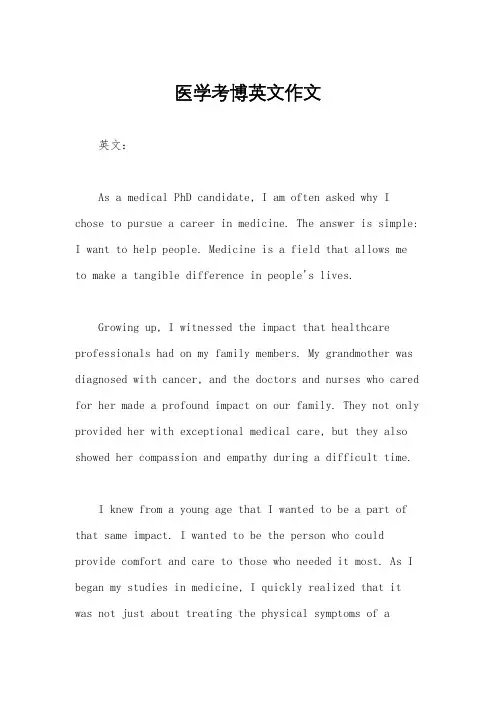
医学考博英文作文英文:As a medical PhD candidate, I am often asked why I chose to pursue a career in medicine. The answer is simple: I want to help people. Medicine is a field that allows me to make a tangible difference in people's lives.Growing up, I witnessed the impact that healthcare professionals had on my family members. My grandmother was diagnosed with cancer, and the doctors and nurses who cared for her made a profound impact on our family. They not only provided her with exceptional medical care, but they also showed her compassion and empathy during a difficult time.I knew from a young age that I wanted to be a part of that same impact. I wanted to be the person who could provide comfort and care to those who needed it most. As I began my studies in medicine, I quickly realized that it was not just about treating the physical symptoms of adisease, but also about understanding the emotional and psychological impact that it has on patients and their families.One of the most rewarding experiences I have had in my medical training was when I was able to help a patient who was struggling with depression. I was able to provide them with the resources and support they needed to overcometheir illness and improve their overall quality of life. Seeing the positive impact that I was able to make on this patient's life was incredibly fulfilling, and it reaffirmed my passion for medicine.In addition to the personal fulfillment that comes with a career in medicine, it is also a field that offers endless opportunities for growth and advancement. With new advancements in technology and research, there is always something new to learn and discover. This constant evolution and progress is what makes medicine such an exciting and dynamic field to be a part of.中文:作为一名医学博士研究生,我经常被问到为什么选择医学作为职业。
医学考博英语作文范文
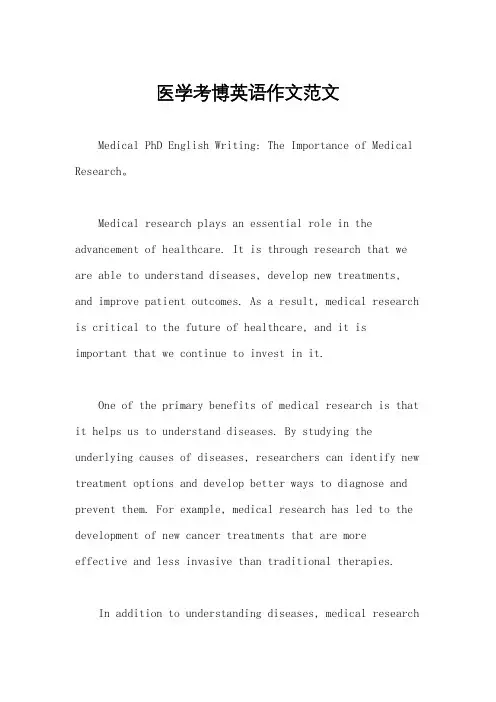
医学考博英语作文范文Medical PhD English Writing: The Importance of Medical Research。
Medical research plays an essential role in the advancement of healthcare. It is through research that we are able to understand diseases, develop new treatments, and improve patient outcomes. As a result, medical research is critical to the future of healthcare, and it is important that we continue to invest in it.One of the primary benefits of medical research is that it helps us to understand diseases. By studying the underlying causes of diseases, researchers can identify new treatment options and develop better ways to diagnose and prevent them. For example, medical research has led to the development of new cancer treatments that are moreeffective and less invasive than traditional therapies.In addition to understanding diseases, medical researchalso helps us to develop new treatments. Through clinical trials and other research studies, we can test the safety and effectiveness of new drugs and therapies. This allows us to identify treatments that are more effective and have fewer side effects than existing options. For example, medical research has led to the development of new drugsfor conditions like diabetes, heart disease, andAlzheimer's disease.Finally, medical research is critical to improving patient outcomes. By studying patient outcomes and analyzing data, researchers can identify best practices and develop new protocols for treating patients. This can lead to better patient outcomes and a higher quality of care. For example, medical research has led to the development of new protocols for treating heart attack patients that have significantly improved survival rates.In conclusion, medical research is essential to the future of healthcare. It helps us to understand diseases, develop new treatments, and improve patient outcomes. As a result, it is important that we continue to invest inmedical research and support the scientists and researchers who are working to advance our understanding of healthcare.。
医学博士英语作文范文
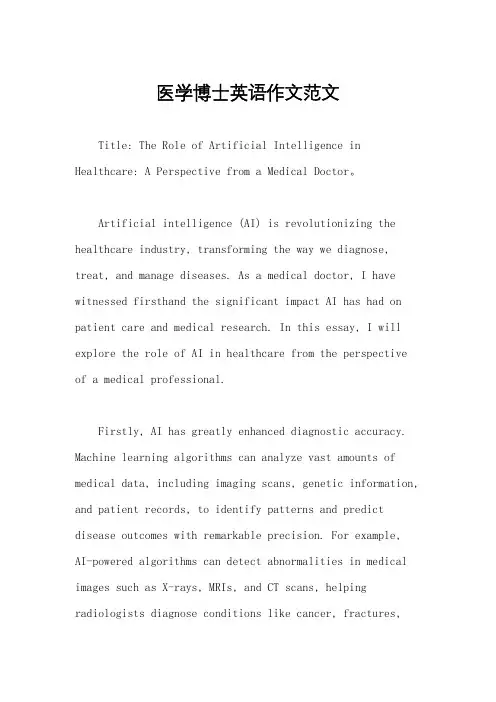
医学博士英语作文范文Title: The Role of Artificial Intelligence in Healthcare: A Perspective from a Medical Doctor。
Artificial intelligence (AI) is revolutionizing the healthcare industry, transforming the way we diagnose, treat, and manage diseases. As a medical doctor, I have witnessed firsthand the significant impact AI has had on patient care and medical research. In this essay, I will explore the role of AI in healthcare from the perspective of a medical professional.Firstly, AI has greatly enhanced diagnostic accuracy. Machine learning algorithms can analyze vast amounts of medical data, including imaging scans, genetic information, and patient records, to identify patterns and predict disease outcomes with remarkable precision. For example,AI-powered algorithms can detect abnormalities in medical images such as X-rays, MRIs, and CT scans, helping radiologists diagnose conditions like cancer, fractures,and neurological disorders more quickly and accurately.Furthermore, AI is revolutionizing personalized medicine. By analyzing genetic data and other patient-specific information, AI algorithms can tailor treatment plans to individual patients, maximizing efficacy and minimizing side effects. For instance, in oncology, AI can help oncologists select the most effective chemotherapy regimen based on a patient's genetic profile, improving treatment outcomes and quality of life.Moreover, AI is driving innovation in drug discoveryand development. By analyzing large datasets of molecular structures, drug interactions, and biological pathways, AI algorithms can identify potential drug candidates more efficiently than traditional methods. This accelerates the drug discovery process, bringing new treatments to market faster and at lower costs. Additionally, AI can optimize clinical trials by identifying eligible patients more quickly, enhancing trial recruitment and reducing timelines.In addition to its clinical applications, AI is alsotransforming healthcare operations and administration. Predictive analytics algorithms can forecast patient demand, optimize staffing levels, and streamline resourceallocation in hospitals and healthcare facilities. Natural language processing (NLP) technology enables automated medical coding and documentation, reducing administrative burden on healthcare providers and improving accuracy and efficiency.Despite its tremendous potential, AI in healthcare also presents challenges and ethical considerations. One concern is the need to ensure patient privacy and data security. As AI systems rely on vast amounts of sensitive patient data,it is imperative to implement robust safeguards to protect patient confidentiality and prevent unauthorized access or misuse of data. Additionally, there are concerns about the potential for algorithmic bias, where AI systems mayproduce discriminatory outcomes, particularly in areas such as diagnosis and treatment recommendations. Addressingthese issues requires close collaboration betweenhealthcare professionals, AI developers, policymakers, and ethicists to establish guidelines and standards forresponsible AI deployment in healthcare.In conclusion, AI is revolutionizing healthcare in myriad ways, from improving diagnostic accuracy and personalized medicine to driving innovation in drug discovery and streamlining healthcare operations. As a medical doctor, I am excited about the transformative potential of AI to enhance patient care, advance medical research, and ultimately improve health outcomes for individuals and populations. However, it is essential to address challenges related to privacy, bias, and ethics to ensure that AI is deployed responsibly and ethically in healthcare. By harnessing the power of AI responsibly, we can unlock new possibilities for the future of medicine and healthcare delivery.。
2017医学考博英语作文
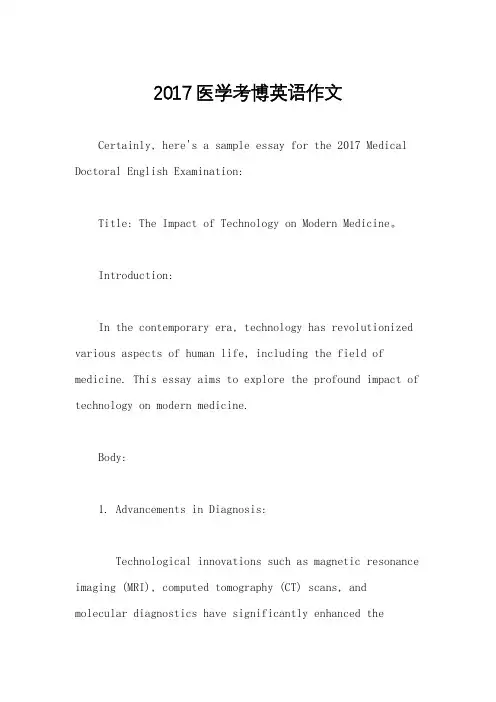
2017医学考博英语作文Certainly, here's a sample essay for the 2017 Medical Doctoral English Examination:Title: The Impact of Technology on Modern Medicine。
Introduction:In the contemporary era, technology has revolutionized various aspects of human life, including the field of medicine. This essay aims to explore the profound impact of technology on modern medicine.Body:1. Advancements in Diagnosis:Technological innovations such as magnetic resonance imaging (MRI), computed tomography (CT) scans, and molecular diagnostics have significantly enhanced theaccuracy and speed of medical diagnosis. These tools allow healthcare professionals to detect diseases at earlier stages, leading to improved patient outcomes and higher survival rates.2. Treatment Modalities:The development of minimally invasive surgical techniques, robotic-assisted surgeries, and targeted therapies has transformed the landscape of medical treatment. These innovations not only minimize patient discomfort and recovery time but also increase the precision of interventions, reducing the risk of complications.3. Telemedicine:The advent of telecommunication technology has facilitated the provision of healthcare services remotely, particularly in underserved rural areas. Telemedicine enables patients to consult with healthcare providers, receive medical advice, and even undergo diagnostic testswithout the need for physical visits to healthcare facilities, thereby improving access to healthcare and reducing healthcare disparities.4. Electronic Health Records (EHRs):The transition from paper-based medical records to electronic health records has streamlined administrative processes, enhanced data accuracy, and facilitated information sharing among healthcare professionals. EHRs enable clinicians to access patients' medical histories promptly, make informed treatment decisions, and coordinate care more effectively, leading to better patient outcomes and continuity of care.5. Medical Research and Development:Technology plays a pivotal role in driving medical research and innovation. High-throughput sequencing, bioinformatics, and computational modeling have accelerated the pace of drug discovery, genetic mapping, and disease understanding. Moreover, advanced imaging techniques andsimulation technologies enable researchers to study complex biological processes in unprecedented detail, laying the groundwork for the development of novel therapies and interventions.Conclusion:In conclusion, technology has become an indispensable ally in modern medicine, revolutionizing diagnosis, treatment, patient care, and research. As technology continues to evolve, its integration into healthcare practices will undoubtedly lead to further advancements, ultimately improving the quality of healthcare delivery and patient outcomes globally.(Word Count: 314)。
2017考博英语作文热点
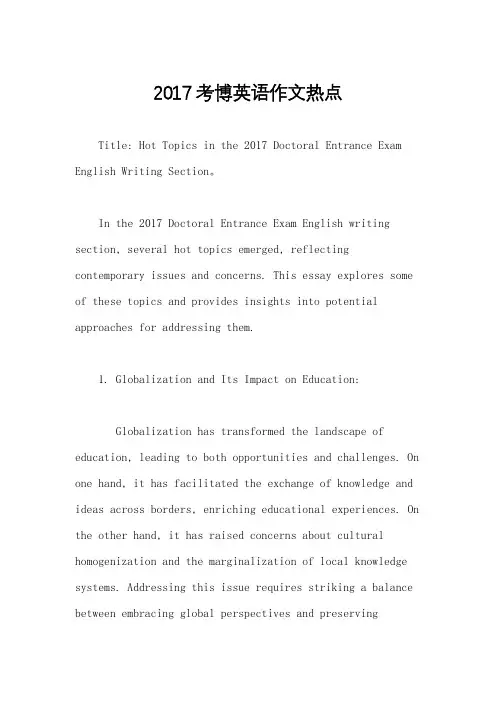
2017考博英语作文热点Title: Hot Topics in the 2017 Doctoral Entrance Exam English Writing Section。
In the 2017 Doctoral Entrance Exam English writing section, several hot topics emerged, reflecting contemporary issues and concerns. This essay explores some of these topics and provides insights into potential approaches for addressing them.1. Globalization and Its Impact on Education:Globalization has transformed the landscape of education, leading to both opportunities and challenges. On one hand, it has facilitated the exchange of knowledge and ideas across borders, enriching educational experiences. On the other hand, it has raised concerns about cultural homogenization and the marginalization of local knowledge systems. Addressing this issue requires striking a balance between embracing global perspectives and preservingcultural diversity.2. Climate Change and Sustainable Development:Climate change poses one of the most pressing challenges of our time, with far-reaching implications for sustainable development. The need to mitigate greenhouse gas emissions and adapt to changing environmental conditions is paramount. Education plays a crucial role in fostering environmental awareness and promoting sustainable practices. Emphasizing sustainability in educational curricula and encouraging research in renewable energy and conservation can contribute to addressing this issue.3. Technological Advancements and Education:The rapid advancement of technology has revolutionized the way we teach and learn. From online courses to virtual reality simulations, technology offers innovative solutions to enhance educational experiences. However, it also raises concerns about the digital divide and the impact of screen time on cognitive development.Embracing technology while ensuring equitable access and promoting digital literacy is essential for harnessing its full potential in education.4. Gender Equality and Women's Empowerment:Gender inequality remains a pervasive issue in many societies, affecting access to education and opportunities for women. Promoting gender equality in education involves addressing systemic barriers and biases, as well as empowering women to pursue higher education and leadership roles. Efforts to challenge gender norms and stereotypes, along with implementing policies that promote equal access and representation, are critical for fostering inclusive and equitable educational environments.5. Mental Health Awareness and Support Services:The prevalence of mental health issues among students has gained increasing recognition in recent years. High levels of academic pressure, social stressors, and financial burdens can exacerbate mental health challenges.It is essential to prioritize mental health awareness and provide accessible support services within educational institutions. This includes destigmatizing mental illness, promoting self-care and resilience, and ensuring access to counseling and psychological resources.6. Ethical Considerations in Research and Innovation:With the advancement of scientific research and technological innovation comes the responsibility to consider ethical implications. Issues such as research integrity, data privacy, and the responsible use of emerging technologies require careful consideration and ethical oversight. Incorporating ethics education into research training programs and establishing ethical guidelines and review processes can help ensure that research and innovation are conducted in a socially responsible manner.In conclusion, the 2017 Doctoral Entrance Exam English writing section reflected a range of hot topics that underscored the complexities and interconnectedness ofcontemporary issues in education and society. Addressing these topics requires interdisciplinary approaches, collaboration, and a commitment to promoting positive change. By engaging with these issues thoughtfully and critically, we can contribute to building a more inclusive, sustainable, and equitable future.。
医学考博英语写作范文
医学考博英语写作范文英文回答:Topic: The Impact of Social Media on the Medical Field.Social media has become an integral part of our livesin recent years, and its impact on the medical field is no exception. On the one hand, social media can be a valuable tool for medical professionals to share information, connect with colleagues, and educate patients. On the other hand, there are also concerns about the potential for misinformation and privacy breaches.Positive Impacts of Social Media on the Medical Field.Improved communication and collaboration: Social media platforms allow medical professionals to connect with each other from all over the world, share research ideas, and collaborate on projects. This can lead to improved patient outcomes and the development of new and innovativetreatments.Increased access to information: Social media provides patients with easy access to a wealth of health information, including information on diseases, treatments, and healthy living. This can help patients to make informed decisions about their health and to stay up-to-date on the latest medical advances.Patient education and support: Social media can be a powerful tool for patient education and support. Medical professionals can use social media to share educational materials, answer patients' questions, and provide support and encouragement. This can help patients to feel more informed and empowered about their health.Negative Impacts of Social Media on the Medical Field.Misinformation and fake news: Social media can be a breeding ground for misinformation and fake news, which can have serious consequences for patients. Misinformation can lead patients to make poor health choices or delay seekingtreatment, which can ultimately lead to worse health outcomes.Privacy concerns: Social media companies collect avast amount of data from their users, including health data. This data can be used to target patients with advertisingfor specific drugs or treatments, or it can be sold tothird-party companies. This raises concerns about theprivacy of patients' health information.Cyberbullying and harassment: Social media can be a platform for cyberbullying and harassment, which can have a negative impact on the mental health of medical professionals. Cyberbullying can also damage the reputation of medical professionals and make it difficult for them to provide quality care to their patients.Recommendations for Using Social Media in the Medical Field.In order to maximize the benefits of social media while minimizing the risks, it is important for medicalprofessionals to use social media responsibly. Here are a few recommendations:Be mindful of the information you share: Only share information that is accurate, evidence-based, and appropriate for the audience you are sharing it with.Respect patient privacy: Do not share any patient information without their consent.Be aware of the potential for cyberbullying and harassment: If you experience cyberbullying or harassment, report it to the social media platform and to your supervisor.Use social media to promote health and well-being: Use social media to share health information, answer patients' questions, and provide support and encouragement.Conclusion.Social media is a powerful tool that can have bothpositive and negative impacts on the medical field. By using social media responsibly, medical professionals can harness its power to improve patient outcomes, advance medical research, and educate the public about health.中文回答:社交媒体对医学领域的影响。
医学考博英语作文万能模板及范文
医学考博英语作文万能模板及范文Studying for the medical doctoral entrance exam can be a challenging and daunting task. 考博医学英语作文的准备可能是一项艰巨且令人望而却步的任务。
It requires a great deal of dedication, hard work, and perseverance in order to succeed. 成功需要极大的奉献精神、努力工作和坚持不懈。
One of the most crucial aspects of preparing for the medical doctoral entrance exam is mastering the English language. 考博医学英语作文准备的最重要方面之一是掌握英语。
Proficiency in English is essential for communication with fellow researchers, understanding scientific literature, and collaborating on global research projects. 对英语的熟练掌握对于与其他研究人员交流、理解科学文献以及参与全球性研究项目合作至关重要。
In addition, the ability to write clear and concise English essays is a valuable skill that will benefit aspiring medical researchers in their academic and professional careers. 另外,具备写清晰简洁的英语文章的能力是一种宝贵的技能,将有助于有抱负的医学研究者在其学术和职业生涯中取得成功。
医学考博英语写作
医学考博英语写作医学考博英语写作范文医学考博比一般的考博更难,尤其是英语的'写作。
下面,店铺为大家送上两篇医学考博英语写作的范文,希望对大家有所帮助。
医学考博英语写作篇1Communication and LanguageOne of the first things we think about when we hear the word communication language. There are thousands of languages spoken around the world today. In fact, linguistis say that there may be as many as 10000.Speaking with others is an important means of communication, but we can also communicate without using words, that is by nonverbal communication. Nonverbal communication includes voice quality, eyes movement, facial expression and body movements such as gestures and change in body position. But many people do not realize that everyone uses nonverbal communicatio n. Sometimes, we “say” more with our face and gestures that we do with our voices.Books, magazines, newspapers, radio, television, are other means of communication. Today we can also communicate over long distance with the help of communications satellites. Some scientists say that soon machines will be developed for sending message through the earth. The technology necessary to build these machines is very complex. But the language we speak every day is much more complex than the most modern communication technology.医学考博英语写作篇2On the Attitude towards Fighting against CriminalsToday crime rate in our cities seems to be rising. Thefts,robberies, and murders are reported to take place even in the broad daylight.Facing crime tide, people may take different attitudes. Some feel frightened and prefer to turn a blind eye to the criminals. Others are resolute and dare to run risk at the cost of their lives in fighting with the criminals. They take it as their duty to protect the social law and order. As for me, I take the attitude of the latter.To ensure the social security and protect people’s safety, I may have some suggestions to make. First of all, the government should always keep a continuous law education among the people, especially, in the younger generations. Secondly, criminals should be punished severely. And finally, it is imperative to set up a public foundation system to award those who set merits in fighting criminals.。
2017年医学博士考试《外语》真题及详解
2017年医学博士考试《外语》真题(总分100, 考试时间90分钟)Section A1. Rheumatologist advises that those with ongoing aches and pains first seek medical help to______ the problem.A affiliateB alleviateC aggravateD accelerate答案:B解析:风湿病学家建议,那些持续疼痛和痛苦的人首先应该借助医疗来缓解问题。
affiliate"接纳,为……工作",alleviate"减少,减缓",aggravate"增加",accelerate"加速"。
根据题意,正确答案为B。
2. An allergy results when the body have a(n)______reaction to certain substances introduced to it.A spontaneousB negativeC adverseD prompt答案:C解析:当身体对某种外来物质产生不良反应时,就会出现过敏现象。
spontaneous"同时的",negative"负面的",adverse"不利的",prompt"立刻的"。
在有关过敏的语境里,一般"不良反应"用an adverse reaction,而不用negative,正确答案为C。
3. Diabetes is one of the most______and potentially dangerous diseases in the world.A crucialB virulentC colossalD prevalent答案:D解析:糖尿病是世界上最普遍的潜在危险疾病之一。
- 1、下载文档前请自行甄别文档内容的完整性,平台不提供额外的编辑、内容补充、找答案等附加服务。
- 2、"仅部分预览"的文档,不可在线预览部分如存在完整性等问题,可反馈申请退款(可完整预览的文档不适用该条件!)。
- 3、如文档侵犯您的权益,请联系客服反馈,我们会尽快为您处理(人工客服工作时间:9:00-18:30)。
2017医学考博英语作文分析及范文指导(2)医学考博英语作文内容为要求考生根据一篇800-1000字的汉语医学
科普文章,写出一篇200字的英文摘要,很多考博生感到无从下笔,新东
方在线考博频道将带领大家根据模医学考博英语作文拟试题进行分析指导。
Directions:In this part there is an essay inChinese. Read it carefully and then write a summary of 200 words in English onthe ANSWER SHEET. Make sure that your summary covers all the major points ofthe article.
长期以来,我国传统医德把“救人活命”、“延年益寿”当作医生唯一职责,认为医学的目的是维持生命,即使最低的生命质量也应不惜代价去延续它,这种道义主义偏重生命的数量,而不顾及生命的价值和效果。
我们认为,
救死扶伤应该是指那些有存活意义的生命,对于拯救绝症垂死的生命,那
只是一个善良的愿望,并无任何积极意义。
医务人员不惜一切代价,借助
现代医疗设备,维护病人的心跳和呼吸,延长一个无价值的生命,表面上
看来实行了人道主义,合乎医学伦理道德,实际上却是无谓地延长和加重
了病人的痛苦。
安乐死作为满足绝症病人“无痛致死”愿望的一种临终处置方法,它不是授人以死,而是授死者以安乐,它不是死亡的直接原因和性质,而是死亡
过程中的一种良好状态。
安乐死的本质不是决定“生与死”,而是决定垂死病人死亡的过程是“痛苦死”还是“安乐死”,它的目的在于使必死的病人无痛苦地死去,提高生命末端的质量,体面地、有尊严走向死亡。
因此,安乐死
不是非人道的“变相杀人”,它蕴含着极高的伦理道德意义。
首先,实施安乐
死符合病人的自身利益。
对于身患绝症,临近死亡、肉体极度痛苦的病人应其本人的恳求予以安乐死,它并没有改变病人必死的结局,只是改变了病人继续忍受和延长毫无意义的痛苦的命运,是对病人选择死亡的时间和方式、以尽早摆脱肉体痛苦和精神折磨的权利的:尊重和保障。
因此,实施安乐死,是在特定情况下病人的最高利益的体现,符合医学伦理道德的基本要求。
其次,安乐死反映了人类无痛苦死亡的愿望和对“优死”的企盼,是人类理性的觉醒。
“生”与“死”同时存在,相伴相随,构成人生的全过程。
伴随着社会的发展,科技的进步,人们生活质量的提高,追求生命的价值,提高生存的质量逐步成为人们新的选择。
人类在提倡“优生、优育、优活”的同时,也倡导“优死”,人们期望在生命的终期,尽可能减少死亡时的痛苦,提高“死”的质量,让人们能够勇敢地接受死亡,维护人类尊严。
因此,安乐死的实施,提高人的生命终期的质量,改善人类“死”的状况,给病人以尊严的死,无痛苦的死,是完全符合人道主义的。
再次,安乐死维护的是一种利他主义的尊严。
安乐死不仅能解除病人临终时的极度痛苦,至死保护人的尊严,而且能够使社会有限的卫生资源得到合理应用,也减轻了病人亲属的负担。
我国是一个发展中国家,医疗卫生资源十分有限,不能满足13亿人口的需要。
如果对濒临死亡的绝症病人进行毫无效果的救治,既违反了病人的意愿,延续病人的痛苦,又浪费了医疗卫生资源,使社会、尤其是病人的亲属承受巨大的经济负担和精神负担,这本身就不符合医学伦理学的基本要求。
因此,安乐死的实施有助于人们正视死亡,笑迎死亡,完成个人对家庭、对社会乃至人类的义务,让人生的落幕更尊严、更辉煌、更有价值。
随着现代医学的迅速发展和人们思想观念的日益更新,安乐死已日趋为人们所理解和接受,成为诸多绝症晚期病人及其亲属的企盼。
实践证明安乐死是可行的,也是道德的。
我们期盼加快安乐死在我国的立法工作,让安乐死合情合理又合法。
【写作分析】
这篇文章从结构上来说不太清晰,所述内容较多且繁杂,想在很短的篇幅中把问题说得清清楚楚,整理起来有相当的难度。
首先要找出其主旨:捍卫安乐死,为安乐死辩解。
安乐死非但不是“变相杀人”,相反,它可以提高生命末端的质量,可以使病人体面地、有尊严地走向死亡,无痛苦地死去。
然后,从结构上把文章分成三个部分:
1. 安乐死这个问题的提出。
2. 安乐死的定义及作者提出的几条理由。
3. 对未来人们对安乐死的态度的推断和展望。
阅读过程中,务必用一支铅笔把你认为关键的句子,短语,尤其是提纲挈领的句子划下来。
这样你就不会陷入作者的“迷魂阵”了。
文章虽然与医学有关,但实际上太专深的医学术语并不是很多。
有几个关键词考生是必须掌握并用在摘要中的。
这些词包括:
安乐死euthanasia
伦理学的ethical
道德的moral
合法化legalize/-ation
患绝症的terminally ill
垂死的dying
延长prolong
质量quality
送你一句话:“写作时,切忌…见木不见林‟,要体现出层次感,结构要明快,这样可以向阅卷老师表明你的逻辑性很强,抓住了要点”。
